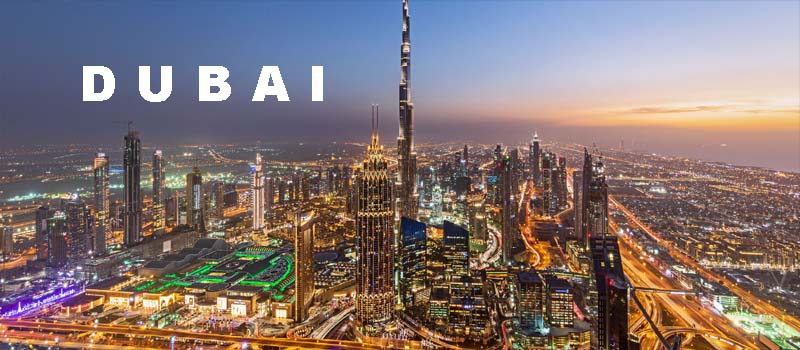The History of Dubai (United Arab Emirates)

Dubai has a rich history that dates back thousands of years. Some key events in the history of Dubai include:
Dubai is a city and emirate in the United Arab Emirates (UAE) known for its modern architecture, luxury shopping, and vibrant nightlife. It is located on the southeast coast of the Persian Gulf and is the capital of the Emirate of Dubai. Some of its popular tourist attractions include the Burj Khalifa (tallest building in the world), the Dubai Mall, Palm Jumeirah, and the Dubai Fountain. Dubai is also a hub for business, trade, and finance in the Middle East and has a diverse economy relying on industries such as tourism, real estate, and finance.
Ancient history: Archaeological evidence suggests that the area around Dubai has been inhabited since the 3rd millennium BCE. During the Iron Age, the area was part of a larger region known as the Magan Civilization.
Pearling industry: Dubai’s history is closely tied to the pearling industry, which was a major source of wealth for the region for centuries.
British influence: In the 19th century, Dubai came under the influence of the British Empire, which helped to establish the city as a center of trade and commerce.
Formation of the UAE: In 1971, Dubai joined with six other emirates to form the United Arab Emirates (UAE).
Oil discovery: In the late 1960s, oil was discovered in Dubai, leading to a period of rapid growth and modernization for the city.
Expansion and modernization: In recent decades, Dubai has undergone a period of rapid expansion and modernization, with the construction of iconic structures such as the Burj Khalifa and the creation of large-scale real estate development projects such as the Palm Jumeirah.
Global hub: Today, Dubai is a major global hub for trade, tourism, and finance, and is known for its luxurious lifestyle, vibrant culture, and cutting-edge technology.
Overall, the history of Dubai is a story of resilience, innovation, and growth, as the city has transformed from a small fishing village into a major global city.
Economy of Dubai
Dubai’s economy is largely based on trade, tourism, real estate, and financial services. Key industries include:
Tourism: Dubai is a major tourist destination with its luxury hotels, shopping centers, and tourist attractions.
Real Estate: The city is known for its large-scale real estate development projects such as the Palm Jumeirah and the Burj Khalifa.
Trade: Dubai is a major trading hub for the Middle East and has established itself as a global center for trade, particularly in gold and diamonds.
Financial Services: Dubai has a well-developed financial sector and is a hub for banking and investment in the region.
Energy: Dubai is working to diversify its energy sector and has made significant investments in renewable energy, including solar and wind power.
Transportation: Dubai has a well-developed transportation network, including its airports and ports, which contribute to its status as a hub for trade and tourism.
Healthcare and Education: Dubai has a growing healthcare and education sector, with numerous international hospitals and universities.
Overall, Dubai’s economy has been growing rapidly in recent years, driven by investments in real estate, infrastructure, and tourism.
Tradition of Dubai
Dubai has a rich cultural heritage rooted in Bedouin traditions and Islamic values. Some traditional customs and practices in Dubai include:
Hospitality: Hospitality is highly valued in Dubai, and visitors are often welcomed with open arms and treated with respect.
Family: Family is considered to be the foundation of society in Dubai, and extended family members often live close to each other and support one another.
Respect for elders: Older individuals are highly respected in Dubai, and it is customary to show respect to elders by standing when they enter a room and speaking respectfully.
Dress code: Dubai follows a conservative dress code, and it is expected that visitors cover their arms and legs in public.
Cuisine: Dubai’s cuisine reflects its diverse population and is influenced by the cuisine of the Middle East, India, and other parts of Asia.
Islam: Islam is the dominant religion in Dubai, and many traditional practices and customs are based on Islamic teachings.
Arts and Literature: Dubai has a rich history of traditional arts and literature, including poetry, storytelling, and music.
Overall, Dubai is a city that values its traditional heritage and works to preserve its cultural customs and practices. At the same time, it is also a modern, cosmopolitan city that is open to new ideas and experiences.
Life style of Dubai
Dubai is a city that offers a unique blend of modern luxury and traditional cultural practices. The lifestyle in Dubai can be described as:
Fast-paced: Dubai is a city that is always on the move, and its residents enjoy a fast-paced lifestyle with plenty of activities and events to keep them busy.
Luxurious: Dubai is known for its luxurious lifestyle, with top-notch dining, shopping, and entertainment options, as well as world-class hotels and resorts.
Outdoor activities: Despite its modern lifestyle, Dubai is also a city that values its natural beauty, with plenty of outdoor activities and opportunities for adventure.
Food and dining: Dubai is a city that loves food, with a diverse culinary scene that offers everything from traditional Middle Eastern cuisine to international flavors.
Family-friendly: Dubai is a family-friendly city, with plenty of parks, play areas, and attractions for children.
Health and wellness: Dubai is also a city that values health and wellness, with numerous gyms, yoga studios, and wellness centers, as well as a growing wellness tourism industry.
Cultural diversity: Dubai is a city that is home to a diverse population, with residents from around the world bringing their own unique cultural traditions and practices.
Overall, the lifestyle in Dubai is fast-paced, luxurious, and offers plenty of opportunities for both indoor and outdoor activities, dining, and entertainment.
